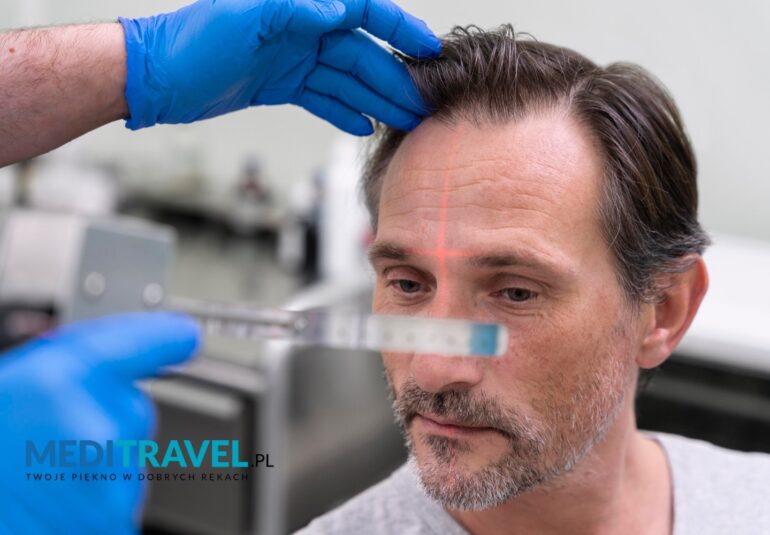
Hepatitis C – can I still have a hair transplant?
This is a very important question, because Hepatitis C is a contagious disease caused by the HCV virus, and another person can be infected by coming into contact with the blood of a person with Hepatitis C. Therefore, every precaution should be taken to avoid any possible infection.
Can Hepatitis C cause hair loss?
Our liver has an important job of breaking down toxins and helping our body to eliminate them; so when it is not working properly due to the effects of HCV or disease treatment, toxins build up in our body and all the essential nutrients have more difficulty reaching the cells. All these problems associated with Hepatitis C can manifest as tissue deficiencies, such as skin or hair , because they will not be able to repair themselves.
So the answer to the question “Does Hepatitis C cause hair loss?” It sounds yes, HCV can cause hair loss. In addition, some of the drugs used to treat the hepatitis C virus can cause changes in our hair and even lead to hair loss. However, usually these side effects are temporary and the hair will return to normal once the treatment is over.
Who is at risk from the Hepatitis C virus?
The risk of Hepatitis C virus (HCV) infection is increased if:
- You have unprotected sex with more than 1 partner.
- You have or have had a sexually transmitted disease
- You have undergone haemodialysis (blood filtered through a machine)
- You have worked with infected blood or needles
- You have had tattoos using non-sterile equipment
- Shared needles to inject drugs with other people.
Can I have a hair transplant, if I have active or untreated hepatitis C?
As Hepatitis C is a contagious disease, we need to make sure that no one is infected; we are committed to the safety of our medical team and our clients. Besides, performing hair transplant surgery when HCV is active or untreated can pose a high risk of infection for the patient himself. In addition, the transplanted area can become infected, causing the operation to fail.
This is why we never perform hair transplants or any aesthetic procedures, if the patient tests positive for Hepatitis C and the disease is not treated. This means that if our patient has active Hepatitis C, we unfortunately cannot perform a hair transplant procedure.
At the very beginning, during the first online consultation, we always ask our patients about the possibility of Hepatitis. This is very important information because if a patient has active Hepatitis C, the hair transplantation will be cancelled. We never start the procedure until we are sure that the patient does not have any infectious diseases.
Upon arrival in Istanbul, a blood sample is taken for examination at the hospital. The blood count is checked and among other things we check if the Hepatitis C virus is present. If the patient has Hepatitis C and hides or ignores this important information, the procedure will be cancelled and the patient would have travelled to Istanbul for no reason. We strongly advise all our patients to do a blood test and to check for sexually transmitted diseases, so that they can be sure of their health before travelling to Istanbul.
Can I have a hair transplant, if I have cured or treated Hepatitis C?
Patients who have a history of Hepatitis C will always have antigens against this virus in their blood. In this situation a hair transplant is possible, but it is very important to save more time and come to Istanbul at least 5 days before the procedure. During this time an additional blood test is performed so that we can be 100% sure of the presence or absence of the disease.
What type of test is performed to detect HCV?
The test we perform to rule out the presence of HCV is called Hepatitis C antibody, or anti-HCV test. It is the primary test for detecting the presence of antigens against HCV. In the very beginning, an immunochemical technique is used to detect the presence of HCV.
This test involves the detection of nti-HCV antigens (anti-HCV). The antigens are detected from the patient’s serum or plasma. If the result turns out to be reactive – that is, positive – another, more accurate test would be necessary.
What happens if this test is positive?
If the anti-HCV test is positive, an additional PCR test for HCV or HCV RNA must be done, which rules out the presence of an active version of the disease. This second test takes a little longer than the antigen detection test because it is quite a complicated test.
This test is based on the detection of viral RNA in the blood. Viral RNA can be compared to human DNA; if viral RNA particles are detected in the blood, this indicates an active form of the disease. To perform the test, a sample of blood is placed in a special machine, and the duration of the test depends on this machine: sometimes the waiting time for the test results is longer. As a result, the day on which the transplant operation is finally performed may also change.
Why, if the patient is cured, do basic tests indicate the presence of the disease?
This is because the antigens produced during the disease remain in the blood for the rest of your life. The basic test that we perform for every patient is a test to detect HCV antigens in the patient’s blood.
Antigens are proteins produced during the body’s immune response: they are proteins directed against the virus. For this reason, when a patient has or has had hepatitis C, the antigens against HCV are present in his body for the rest of his life, and the test is always positive.
How much does an additional test cost?
A basic antiviral detection test is included in the package price. However, if the result is positive, an additional HCV RNA test will have to be performed, which costs additionally.
A patient who has had Hepatitis C in the past must arrive in Istanbul 5 days in advance. We need to be sure of each patient’s condition before performing the hair transplant procedure. Besides, we do not accept tests performed and brought from another country.
Why might the duration of the test change?
The HCV RNA test takes more time because we place the blood sample in our laboratory in a special machine, which checks for the presence of the virus itself. As the test result depends only on the performance of the machine, we cannot set an exact date for the completion of the test.
Will the disease affect the hair transplant and the healing process?
If you have an inactive form of Hepatitis C, don’t worry: patients with an inactive form of the disease have no problem at all with the hair transplant procedure. Neither the procedure nor the healing process will be affected.
Please note that we are not responsible for the possible consequences if you hide or do not know about positive/active hepatitis C.
How many days do I need for a hair transplant if I have Hepatitis C?
If you have been treated for Hepatitis C, it will take a total of 5 days to get the results of the additional HCV PCR test and get the hair transplant surgery in Istanbul. The general procedure would be as follows:
- Arrival in Istanbul: on Sunday or Monday very early in the morning.
- Blood test: the patient must be in our hospital on Monday morning at 9:00 (no tests accepted after 10:00)
- HCV PCR test result: we will get the result of the additional test on Wednesday evening or Thursday morning.
- Hair transplant surgery: everything now depends on how long it takes to complete the test, but there is no problem with having the surgery on the same day. However, it is also possible that the test will end on Thursday: in this case, the procedure will be carried out on the same Thursday or, at most, on Friday.
- Travel back to your country: on Saturday, the post-operative check-up and removal of the bandage will be carried out. You will be able to return home that afternoon.
Therefore, a 6-day trip from Sunday to Saturday will be ideal to have a hair transplant in Turkey if you have treated or undetectable hepatitis C. If you give us all the necessary information, at Clinicana we can give you the best available solution for your situation: trust us, as thousands of satisfied customers have done. Browse hair transplant reviews in Turkey via Meditravel and request a free online consultation.



